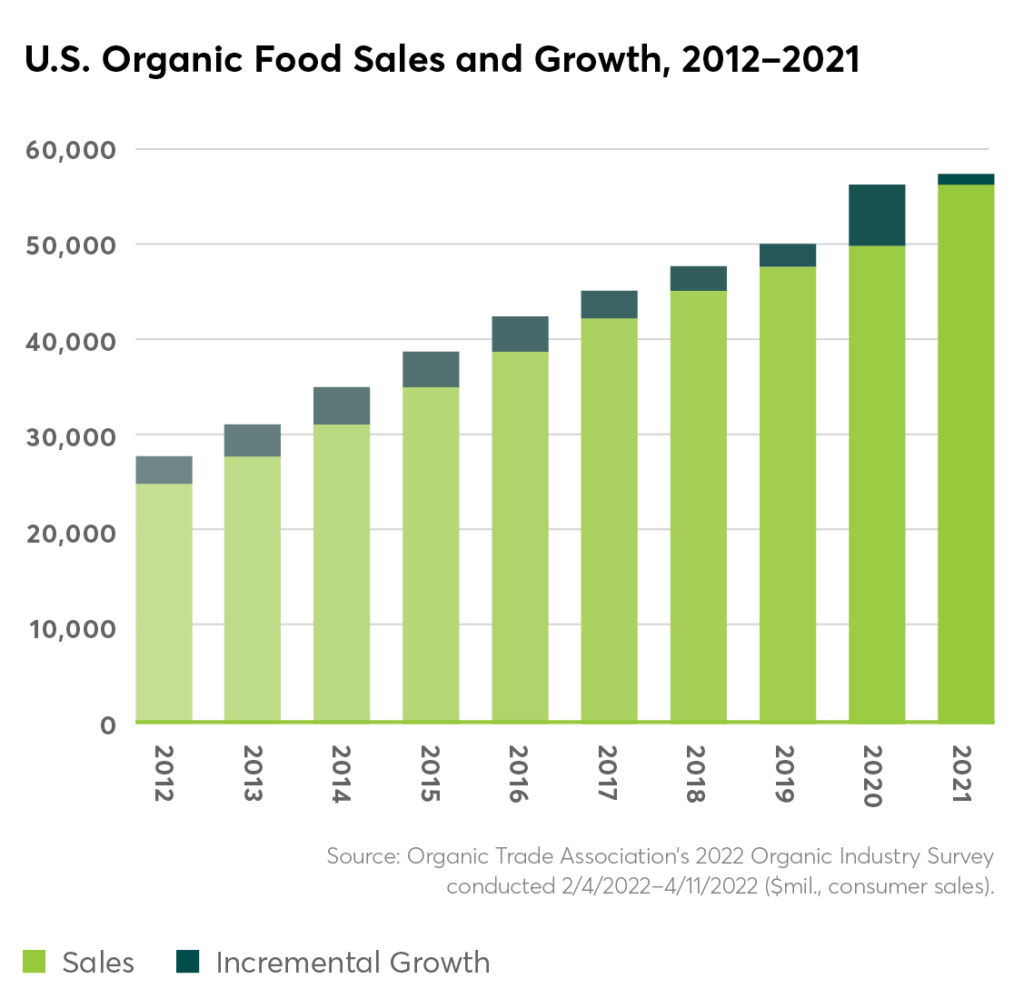OTA MAKES CLEAR ITS ORGANIC PRIORITIES FOR THE 2023 FARM BILL
America’s Organic Trade Association (OTA) has called for a new Farm Bill this year that recognises the role the $63 billion US organic sector plays in agriculture by setting out some clear priorities. It hopes these will support the growth and success of organic agriculture into the next decade and beyond.
The OTA has outlined policies to ensure organic standards keep pace with marketplace demands and provide supportive research and risk management tools to organic farmers and to strengthen the resilience of the organic supply chain.
Tom Chapman, CEO of the trade association, said: “Organic is one of the country’s fastest-growing food production and processing categories, but despite the sector’s strengths, the industry faces challenges that Congress must address in the next Farm Bill. The benefits of organic go far beyond the farm gate. We’ve developed a set of priorities that will build off the progress made in the 2018 Farm Bill.”

A long priority list
The OTA’s wish-list for the latest bill includes the following:
- Updating the Organic Foods Production Act to establish a preplanned, predictable timeline (no later than once every five years) to review and update organic standards so they continue to meet consumer expectations
- Strengthening the National Organic Program’s (NOP) enforcement authority against false or misleading organic claims
- Increasing funding for core organic projects authorised in the Farm Bill including the Organic Research and Education Initiative (OREI), Organic Data Initiative (ODI), Organic Certification Cost-Share Program (OCCSP) and the National Organic Program
- Expanding organic market data collection and improving risk management tools for farmers
- Prioritising and increasing funding for conservation practices that build soil health
- Acknowledging organic agriculture’s contributions to protecting natural resources in current and future USDA conservation and climate-smart verification programmes
- Authorising and investing in new projects to increase technical assistance for organic and transitioning farmers, and to facilitate market development and infrastructure grants to expand domestic organic production and processing capacity.
Equitable and forward-looking
The OTA’s Farm Bill priorities are the result of consultations and recommendations by the association’s Farmers Advisory Council (FAC), one of the largest coalitions of organic farmers and farming organisations in the US. They were carried out because an equitable and forward-looking Farm Bill cannot realistically be shaped without the voice of farmers.
The FAC represents over 9,500 growers of all sizes from all regions of the country. They produce a wide range of crops, from meat and livestock products to grains, fruits and vegetables.

In preparing for the new Farm Bill, OTA also ran workshops with nearly 300 certifiers, growers, consumer-facing brands, retailers, and non-profit organisations. “The Farm Bill has a huge impact on the future of organic agriculture, and we need to capitalise on the gains that organic achieved in the 2018 Farm Bill,” said FAC co-chair Doug Crabtree, an organic farmer from Montana.
He added: “While still not funded to the proportion of food spending by consumers, organic research did receive a big funding boost in the last bill. But crop insurance rules continue to make risk management more challenging. Additionally, support for mentoring and other technical assistance for organic and transitioning farmers would help domestic farmers meet the growing demand for organic food.”
Building on past gains
The 2018 Farm Bill resulted in historic gains in organic oversight. Adam Warthesen, FAC co-chair and director of government and industry affairs for Organic Valley, commented: “Farm bills fundamentally impact organic farmers and our agriculture system. We need to be present to safeguard and advance organic policy and funding priorities as Congress starts deliberating the next Farm Bill.”
“If we want to keep organic advancing, we need to make sure that lawmakers hear our voice,” said OTA’s Chapman. “Congress should not only continue to protect the integrity of the USDA Organic label but ensure that organic standards continuously improve over time.”
The US government is continuing its state field hearings throughout the “early parts” of 2023 and the Senate Committee in charge is still inviting ideas and proposals for the 2023 bill, as well as feedback about the 2018 Farm Bill. Submissions can be made via this form or by emailing FarmBill2023@ag.senate.gov.
[Lead image courtesy of Phuc Long/Unsplash.]
Join us at SIAL Paris as exhibitor Join us at SIAL Paris as visitor
